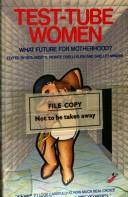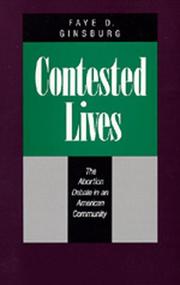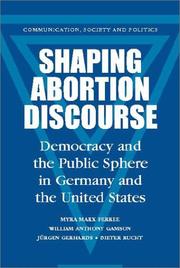| Listing 1 - 6 of 6 |
Sort by
|
Book
ISBN: 1789200717 178533428X 1785334271 Year: 2017 Publisher: New York ; Oxford, [England] : Berghahn Books,
Abstract | Keywords | Export | Availability | Bookmark
 Loading...
Loading...Choose an application
- Reference Manager
- EndNote
- RefWorks (Direct export to RefWorks)
Since World War II, abortion policies have remained remarkably varied across European nations, with struggles over abortion rights at the forefront of national politics. This volume analyses European abortion governance and explores how social movements, political groups, and individuals use protests and resistance to influence abortion policy. Drawing on case studies from Italy, Spain, Norway, Poland, Romania, Russia, Sweden, Switzerland, the United Kingdom and the European Union, it analyses the strategies and discourses of groups seeking to liberalise or restrict reproductive rights. It also illuminates the ways that reproductive rights politics intersect with demographic anxieties, as well as the rising nationalisms and xenophobia related to austerity policies, mass migration and the recent terrorist attacks in Europe.
Abortion --- Pro-choice movement --- Pro-life movement --- Government policy --- Moral and ethical aspects --- Anti-abortion movement --- Antiabortion movement --- Right-to-life movement (Anti-abortion movement) --- Birth control --- Women's rights --- Abortion rights movement --- Free-to-choose movement --- Freedom-of-choice movement --- Pro-abortion movement --- Right-to-choose movement --- Abortion, Induced --- Feticide --- Foeticide --- Induced abortion --- Pregnancy termination --- Termination of pregnancy --- Fetal death --- Obstetrics --- Reproductive rights --- Citizen participation --- Religious aspects --- Surgery --- Abortion Laws, Activism, Abortion, Reproductive Rights, Women's Rights, Healthcare, Anti-Abortion Activism.
Book
ISBN: 1108911226 1108911781 1108919251 1108825966 Year: 2022 Publisher: Cambridge : Cambridge University Press,
Abstract | Keywords | Export | Availability | Bookmark
 Loading...
Loading...Choose an application
- Reference Manager
- EndNote
- RefWorks (Direct export to RefWorks)
This Element analyzes the features of current feminist movements in Latin America and their responses to conservative reactions. For this, it focuses on the pro-choice movement vis-à-vis the anti-abortion countermovement in Mexico and Brazil. It offers a relational approach embracing the dynamics within the feminist field and between feminism and the state to capture the movements' potential effects. First, the Element proposes the concept of nested feminist networks, which comprises of three dimensions revealing the plurality of the movement across intersectional and sexual identity issues (horizontal), its relationship with the multifaceted state (vertical), and the intermediation of political parties and participatory institutions in this relationship (intermediary). Second, it argues that nested networks allow feminists to enable policies and block actions from conservatives. In sum, it explores how feminists, leveraging their plurality and connection with the state, can counter conservative attacks.
Feminism --- Pro-choice movement --- Women --- Political activity --- Human females --- Wimmin --- Woman --- Womon --- Womyn --- Females --- Human beings --- Femininity --- Emancipation of women --- Feminist movement --- Women's lib --- Women's liberation --- Women's liberation movement --- Women's movement --- Social movements --- Anti-feminism --- Abortion rights movement --- Free-to-choose movement --- Freedom-of-choice movement --- Pro-abortion movement --- Right-to-choose movement --- Abortion --- Birth control --- Women's rights --- Emancipation --- Government policy --- Citizen participation --- Moral and ethical aspects --- Religious aspects

ISBN: 0863580300 Year: 1985 Publisher: London Pandora Press
Abstract | Keywords | Export | Availability | Bookmark
 Loading...
Loading...Choose an application
- Reference Manager
- EndNote
- RefWorks (Direct export to RefWorks)
Human reproduction --- Medical innovations --- Pregnancy --- Pro-choice movement --- #GBIB:CBMER --- Abortion rights movement --- Free-to-choose movement --- Freedom-of-choice movement --- Pro-abortion movement --- Right-to-choose movement --- Gestation --- Society and medical innovations --- Social aspects --- Ethics of family. Ethics of sexuality --- Sociology of the family. Sociology of sexuality --- Demography --- Family law. Inheritance law --- Gynaecology. Obstetrics --- India --- Abortion --- Birth control --- Women's rights --- Conception --- Physiology --- Reproduction --- Government policy --- Citizen participation --- Moral and ethical aspects --- Religious aspects --- Sex --- Motherhood --- Reproductive rights --- Reproductive technology --- Population policy --- Book

ISBN: 052092245X 0585054479 9780520922457 9780585054476 0520064925 0520064933 9780520064928 0520064925 9780520064935 0520064933 Year: 1998 Publisher: [Place of publication not identified] University of California Press
Abstract | Keywords | Export | Availability | Bookmark
 Loading...
Loading...Choose an application
- Reference Manager
- EndNote
- RefWorks (Direct export to RefWorks)
Based on the struggle over a Fargo, North Dakota, abortion clinic, Contested Lives explores one of the central social conflicts of our time. Both wide-ranging and rich in detail, it speaks not simply to the abortion issue but also to the critical role of women's political activism.A new introduction addresses the events of the last decade, which saw the emergence of Operation Rescue and a shift toward more violent, even deadly, forms of anti-abortion protest. Responses to this trend included government legislation, a decline in clinics and doctors offering abortion services, and also the formation of Common Ground, an alliance bringing together activists from both sides to address shared concerns. Ginsburg shows that what may have seemed an ephemeral artifact of "Midwestern feminism" of the 1980s actually foreshadowed unprecedented possibilities for reconciliation in one of the most entrenched conflicts of our times.
Abortion --- Abortion services --- Pro-life movement --- Pro-choice movement --- Women social reformers --- Sociology & Social History --- Social Sciences --- Family & Marriage --- Social reformers --- Abortion rights movement --- Free-to-choose movement --- Freedom-of-choice movement --- Pro-abortion movement --- Right-to-choose movement --- Birth control --- Women's rights --- Anti-abortion movement --- Antiabortion movement --- Right-to-life movement (Anti-abortion movement) --- Abortion clinics --- Abortion facilities --- Birth control clinics --- Women's health services --- Abortion, Induced --- Feticide --- Foeticide --- Induced abortion --- Pregnancy termination --- Termination of pregnancy --- Fetal death --- Obstetrics --- Reproductive rights --- Case studies --- Government policy --- Citizen participation --- Moral and ethical aspects --- Religious aspects --- Surgery --- Public policy, united states. --- Induced, united states. --- Legal, united states. --- Case studies.

ISBN: 052179384X 052179045X 1107121302 0511177313 0511041101 0511158270 0511304927 0511613687 1280429879 0511046618 9780511046612 9780511158278 9780521790451 9780511041105 9786610429875 6610429871 9780521793841 9780511613685 Year: 2002 Publisher: Cambridge, UK New York Cambridge University Press
Abstract | Keywords | Export | Availability | Bookmark
 Loading...
Loading...Choose an application
- Reference Manager
- EndNote
- RefWorks (Direct export to RefWorks)
Using controversy over abortion as a lens through which to compare the political process and role of the media in these two very different democracies, this book examines the contest over meaning that is being waged by social movements, political parties, churches and other social actors. Abortion is a critical battleground for debates over social values in both countries, but the constitutional premises on which arguments rest differ, as do the strategies that movements and parties adopt and the opportunities for influence that are open to them. By examining how these debates are conducted and by whom in light of the normative claims made by democratic theorists, the book also offers a means of judging how well either country lives up to the ideals of democratic debate in practice.
Abortion --- Pro-choice movement --- Pro-life movement --- Political aspects --- Press coverage --- Sociology of culture --- Political sociology --- Sociology of the family. Sociology of sexuality --- Mass communications --- United States --- Germany --- Sociologie van de cultuur --- Sociologie van het gezin. Sociologie van de seksualiteit --- Sociologie van de politiek --- Massacommunicatie --- Duitsland --- Verenigde Staten van Amerika --- Social Sciences --- Political Science --- Anti-abortion movement --- Antiabortion movement --- Right-to-life movement (Anti-abortion movement) --- Birth control --- Women's rights --- Abortion rights movement --- Free-to-choose movement --- Freedom-of-choice movement --- Pro-abortion movement --- Right-to-choose movement --- Abortion, Induced --- Feticide --- Foeticide --- Induced abortion --- Pregnancy termination --- Termination of pregnancy --- Fetal death --- Obstetrics --- Reproductive rights --- Government policy --- Citizen participation --- Moral and ethical aspects --- Religious aspects --- Surgery --- Politics and government --- United States of America --- History --- Catholic Church --- Newspapers --- Media --- Political parties --- Points of view --- Women's movements --- Legislation --- Book --- Democracy

ISBN: 0807015083 0807015091 9780807015094 9780807015087 Year: 1983 Volume: 673 Publisher: Boston Beacon
Abstract | Keywords | Export | Availability | Bookmark
 Loading...
Loading...Choose an application
- Reference Manager
- EndNote
- RefWorks (Direct export to RefWorks)
Pro-choice movement --- Abortion --- Feminism --- Moral and ethical aspects --- Political aspects --- Religious aspects --- Christianity --- 241.633 --- -Abortion --- -Feminism --- -#GBIB:CBMER --- Abortion rights movement --- Free-to-choose movement --- Freedom-of-choice movement --- Pro-abortion movement --- Right-to-choose movement --- Birth control --- Women's rights --- Emancipation of women --- Feminist movement --- Women --- Women's lib --- Women's liberation --- Women's liberation movement --- Women's movement --- Social movements --- Anti-feminism --- Abortion, Induced --- Feticide --- Foeticide --- Induced abortion --- Pregnancy termination --- Termination of pregnancy --- Fetal death --- Obstetrics --- Reproductive rights --- Theologische ethiek: abortus --- -Religious aspects --- -Christianity --- Government policy --- Citizen participation --- Emancipation --- Surgery --- Feminism. --- Moral and ethical aspects. --- Christianity. --- 241.633 Theologische ethiek: abortus --- #GBIB:CBMER --- Religious aspects&delete& --- Moral and religious aspects --- Pro-choice movement - United States --- Abortion - Moral and ethical aspects --- Abortion - Political aspects - United States --- Abortion - Religious aspects - Christianity
| Listing 1 - 6 of 6 |
Sort by
|

 Search
Search Feedback
Feedback About UniCat
About UniCat  Help
Help News
News